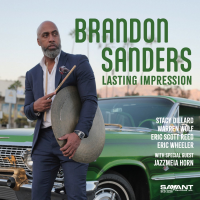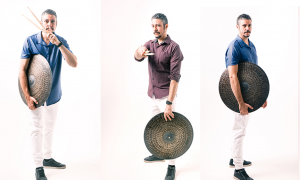Home » Jazz Articles » Interview » Willem Breuker
Willem Breuker
 Willem Breuker's music is an experience—part circus, part orchestra, part theater. The man himself is no less complex and some of his thoughts on being a musician bely his humour and good nature. At Joe's Pub this month with his long-standing Kollektief, Breuker spoke with All About Jazz.
Willem Breuker's music is an experience—part circus, part orchestra, part theater. The man himself is no less complex and some of his thoughts on being a musician bely his humour and good nature. At Joe's Pub this month with his long-standing Kollektief, Breuker spoke with All About Jazz. All About Jazz: Let's start at the beginning.
Willem Breuker: I always wanted to play the piano but after the second world war Holland was a very poor country like all Western Europe. It was not possible to buy a piano so I got a clarinet. I had some lessons and later I tried to go to the music high school and was refused because they said I had no talent for music. But I always wanted to make music; that was my first thing in my life. I listened to a lot of music though I was more interested in improvising than playing charts from a book or playing notes or things that other people had done before—to study an instrument the way they want me to do it. I was more into the result I could make myself. I learned to play the saxophone myself. I could read notes very well; I don't know why, it was just easy or a logical thing to me and I played in an orchestra in the surroundings of Amsterdam. They put me on bass clarinet because no one wanted to play on the bass clarinet...if you go out onto the streets for marches, you cannot play on the bass clarinet so you need a saxophone so they gave me a tenor saxophone and then in the meantime I bought myself an alto saxophone and in the weekends in the normal high school I changed my clarinet with a guy who had a soprano saxophone. So that was just the way I learned to play on the instruments.
And at the same time I tried to write down my musical ideas. I bought myself a fifth-rate piano, a very old thing, and I tried to compose too...in the beginning it was very hard, no one really understood what I was doing. Still, nowadays, a lot of people don't know what I'm doing but that's another question.
I had my own groups, trio, quartets; it was very hard to find people so most of the time when I was doing something I wrote down notes for classical musicians so they didn't have to improvise, they just had to play. I always went to competitions where different new jazz groups showed up. And then there was a jury and they listened to you. Most of the time, it became a scandal when I was there, because I was playing something completely different than what the other guys were doing....I immediately had a name in Holland and I found more people to play with. I found drummers like, for example, Pierre Courbois or later Han Bennink and I found Misha Mengelberg. They were still playing at that time bebop music, Han and Misha, kind of post bebop music so we set up a trio and after a while Gunter Hampel, the German vibraphonist and flutist, invited me to join his band because he heard me play. And then I played in Germany very often and then I met through [Albert] Mangelsdorff, [Peter] Br'tzmann and all the guys. That was '66-67 when it all started so it immediately became my profession. What I always had in mind, I succeeded in that.
AAJ: So you were always a multi-instrumentalist.
WB: I never worked on instruments. I never study instruments because I hate instruments actually. I have no family affair or no connection with instruments. The instrument has to work and that's all I have with it. I say sleep well after a concert, put it in the case until next time. I have nothing with instruments; I have more with thinking about music or producing music or writing music or performing music or whatever. But just the link with the instrument is not there.
AAJ: You don't want to be thought of as "tenor saxophonist" Willem Breuker.
WB: If someone asked me to play the tenor saxophone I will do that. By accident I am playing the soprano saxophone in the Kollektief because no one wants to play the soprano. It is the higher part and the soprano saxophone is a lousy instrument because it is always out of tune, you can't control it very well. So the other guys prefer to play the tenor saxophone and the lady the alto saxophone. But that's the section so sometimes I play the alto or tenor or bass clarinet or whatever. I don't care at all. Mostly soprano, but just by accident not because I want to play soprano.
AAJ: If you don't associate yourself with an instrument, did anybody influence you?
WB: I was listening to music so I like Louis Armstrong and Dizzy and I like Duke Ellington or whatever. That's more about the inventions that they did in music or the way they played and the way they convinced me in music than through their instruments. So that's more important to me. It could be somebody on a recorder or a washboard or a whatever or on a dustbin in the street. Have you heard Han Bennink playing on a dustbin? Great, man'it's unbelievable. And there is another drummer in Holland, he is called Johnny Engels and he is playing on a bar stool with brushes and you've never heard better in your life. You don't need a drumkit at all.
AAJ: Do you think compositionally in different ways for different instruments?
WB: When I think of compositions I think of people; so he or she can play this or that better or good or no good or someone can improvise on that or not. So I can write down for the trumpet players, for this one that and for that one this and so on. So you know exactly the possibilities of the musicians. That's the starting point sometime to make a piece because if you just write something down just for instruments and not for people it works the exact opposite way.
AAJ: You try to write to people's strengths?
WB: In a certain way yes. So you cannot blame a guy like Br'tzmann because he can't read notes. So if you work with Br'tzmann, its very hard because he only knows what he has with his instrument but if you give him notes, you can give him a telephone book but he cannot do anything with it. And that was the beginning years in the '60s: it was very hard to get something from the ground because no one could really read music. It was all free improvisation and in a certain way that was very nice, politically spoken. It was very good that we did that and it shocked a lot of people and made a lot of people very nervous. It was more a political action than a musical action. But after five, six years, think over what you did and then you have to continue, you have to go on, to develop yourself.

AAJ: You seemed to distance yourself from that group.
WB: I came up with my compositions and my musical ideas at the end of the '60s in the Globe Unity Orchestra and with the other groups I was playing with. But they couldn't accept it or they couldn't follow my ideas and they didn't want to do it. So then you separate yourself a little bit from the whole scene because I was not so satisfied after a while with what I was doing in that field because I can play longer, harder, higher, louder, softer, I can play on for three hours without stopping; I can play all those things and it was like a match at that time to play as loud as you could, as hard as you could and destroy as much as was possible. So I could do all these things but it gave no further information on what was going on in my mind. It was too limited for me after a while. I wanted to say "what are our experiences in the last five years?" from '66 on, and I wanted to discuss it or develop the things we knew but no one was really interested in that. Everybody wanted to continue that thing that they were doing.
AAJ: Does composition help you develop as a musician more than free improvisation?
WB: Yes because you discover things you don't know. If you just do things over and over, for instance if you tried to put it in notes or you play a composition, a composition has ideas, you do it again and again and again, you find new ways, sides to come in. To do that composition and after a while, when you play the same piece 20 times, then finally maybe you know a little bit about the piece, about the mystery of the piece. Because if you write something, you don't know what the piece is, you know maybe 70% but the rest has to come from improvisation and doing it over and over, then you know what the weakest things are and what the strong things are. That's my experience.
AAJ: How does the Kollektief's theatrics fit?
WB: But it's so normal. People are jealous these days—"I want to solo, fuck off you." It's the best thing on a small stage, just kick them in the ass. It's like how little children think. We sometimes give concerts for little children and we do very naughty things—the children love it because that's the things they want to do at home and they do it at home but they were always punished for it. But if you see old idiots like us doing it on stage, it's fantastic. And we take it seriously. And we take them seriously. We are not standing there so you have to listen to us, "this is the truth and you have to keep your mouth shut," not at all. We are just one community and that's nice. So all these little things, they are not written down, "okay you kick him from the stage and you take a solo," that's the situation that happens in a certain moment, maybe because the stage was too small or the music stands fell or you break your neck over a microphone cord, whatever. There's always something happening and that's very interesting to me—looking at people and how they react to what you're doing on stage.
AAJ: Do you spend more time writing music or practicing instruments?
WB: I never practice the instrument. Most of the time all my instruments are in the office. You have to fight with an instrument, that's also important. If you play a reed instrument, no reed is the same. It's not like a trumpet where you always have the same mouthpiece but your lips are maybe different every day. Reed instruments are completely different; it is like another person, or another dead body'you have to put life into it. So you practice with the instrument that way, he is your enemy at a certain moment.
Visit Willem Breuker on the web.
Tags
PREVIOUS / NEXT
Support All About Jazz
 All About Jazz has been a pillar of jazz since 1995, championing it as an art form and, more importantly, supporting the musicians who make it. Our enduring commitment has made "AAJ" one of the most culturally important websites of its kind, read by hundreds of thousands of fans, musicians and industry figures every month.
All About Jazz has been a pillar of jazz since 1995, championing it as an art form and, more importantly, supporting the musicians who make it. Our enduring commitment has made "AAJ" one of the most culturally important websites of its kind, read by hundreds of thousands of fans, musicians and industry figures every month.

























